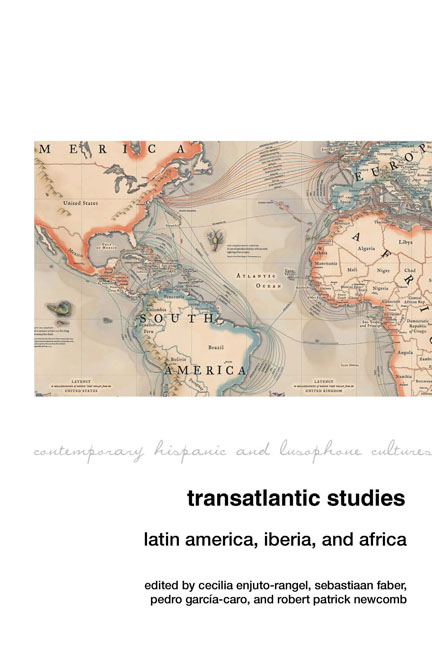Book contents
- Frontmatter
- Contents
- Introduction: Transatlantic Studies: Staking Out the Field
- Transatlantic Methodologies
- Transatlantic Linguistic Debates
- Transatlantic Displacement
- Transatlantic Memory
- Transatlantic Postcolonial Affinities
- Transatlantic Influence
- Epilogue: The Futureâif There Is OneâIs Transatlantic
- Index
32 - Transatlantic Modernisms: Portugal and Brazil
- Frontmatter
- Contents
- Introduction: Transatlantic Studies: Staking Out the Field
- Transatlantic Methodologies
- Transatlantic Linguistic Debates
- Transatlantic Displacement
- Transatlantic Memory
- Transatlantic Postcolonial Affinities
- Transatlantic Influence
- Epilogue: The Futureâif There Is OneâIs Transatlantic
- Index
Summary
Azorean poet and literary critic Pedro da Silveira calls Gonçalves Dias, Raimundo Correia, Olavo Bilac, and other important nineteenth-century Brazilian writers associated with the romantic, realist, and Parnassian literary movements, the last Luso-Brazilians or “os últimos luso-brasileiros” (Silveira 1981). While he acknowledges that Portuguese-Brazilian cultural collaboration continued after this period, Silveira, like other literary critics, recognizes that the nineteenth and the turn of the twentieth century were especially fertile moments of literary alliance between the two countries. These Brazilian writers participated actively inside Portugal and had a strong impact on the way these diverse aesthetic movements developed. Likewise, nineteenth-century Portuguese authors such as Almeida Garret, Antero de Quental, and Camilo Castelo Branco were very attentive to what happened in Brazilian letters. It is well known that Portugal's greatest writer of the late nineteenth century, Eça de Queiroz, had one of his most devoted readerships among the Brazilian public (Lyra 1965), while Brazilian authors were being read, published, and edited in Portugal towards the end of the nineteenth century as well (Almino 2003; Saraiva 1986).
Like Pedro da Silveira, the Brazilian writer and diplomat João Almino also writes about Luso-Brazilian cultural exchanges in an essay titled, “O diálogo interrompido: as relações literárias entre o Brasil e Portugal” [The Interrupted Dialogue: Literary Relations between Brazil and Portugal] (Almino 2003). The interruption refers to the period beginning with the Brazilian military dictatorship in 1964. Almino further claims that despite the end of authoritarian regimes in both countries and the progressive political and cultural changes contemporary Portugal and Brazil have experienced, “o fosso permanece” [the trench remains] (2003: 135). He points to a mutual ignorance in both countries about each other's literary production of the last couple of decades, notwithstanding a handful of scholars and institutions that devote themselves to fostering bilateral cultural links and awareness. This mutual ignorance—I would argue—is slowly and of late being reversed through academic work and the strengthening of relations between contemporary writers and artists. However, the nature of the connections being drawn is changing. The comparative work is increasingly more transatlantic and epistemologically and theoretically wider in approach and adds to the Luso-Brazilian juxtapositions, links to Portuguese-African traditions, and Luso-Hispanic dialogues.
- Type
- Chapter
- Information
- Transatlantic StudiesLatin America, Iberia, and Africa, pp. 397 - 405Publisher: Liverpool University PressPrint publication year: 2019



